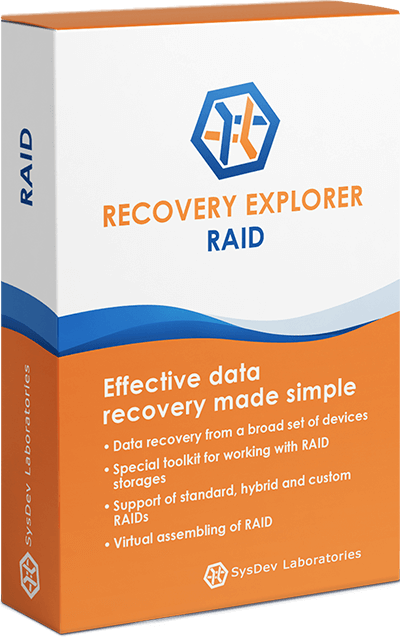Recover data from RAID and other storages with Recovery Explorer RAID
Recovery Explorer RAID is your best bet if you encountered data loss from any type of RAID, whether hardware or software, or a RAID-based device, like NAS. The software handles RAID arrays of standard and nested levels, as well as specific and custom RAID configurations. The user-friendly interface of the program makes the recovery procedure simple and straightforward, even for those lacking technical background. Moreover, the application allows working with any other stand-alone storage medium with the same efficiency, while a set of additional tools will aid you in the process, helping to achieve the desired result with much less effort and time spent.
Recovery Explorer RAID has been developed to provide ordinary users with an effective and at the same time easy to implement solution to data recovery tasks associated with RAID and other storages. If you’re a technical expert, you might be interested in an instrument that is more oriented towards professional staff – UFS Explorer RAID Recovery. Check out the difference between these utilities and decide which of them better suits your requirements.
Wide coverage of modern storage technologies
- Synology SHR
- Btrfs-RAID
- OpenBSD softraid
- RAID 0
- RAID 5
- RAID 6
- Nested RAID
- USB flash drive
- Memory card
- External hard drive
- FAT/FAT32, exFAT
- NTFS
- APFS
- HFS+
- XFS
- Btrfs
- Virtual disk
- Disk image
-
Data recovery from RAID sets of standard, custom and specific setups, including Btrfs-RAID, Synology SHR, OpenBSD softraid
-
Support for various stand-alone storages, like local and portable physical devices, different types of virtual disks and disk images
-
Work with a diversity of file systems from Windows, Linux and macOS
-
Instant access to the content of undamaged storages
-
Multiple variants of a scan: scanning the entire storage for the missing data, search for the lost partitions, cataloging the available file system, signature-based raw data recovery and others
-
Broad set of supplementary options, like assessment of the data integrity, search for specific items, file preview, filters for saving the recovered data and possibility to work in a Wizard-based mode
-
Varied means for convenient analysis of binary data content
-
Compatible with Microsoft Windows, macOS and the majority of Linux distributions
-
A license allows using the program for an unlimited period and offers 360 days of free updates
Features of Recovery Explorer RAID
-
Standard RAID patterns: RAID 0, RAID 1, RAID 3, RAID 4, RAID 5, RAID 6,
-
Hybrid RAID Levels: RAID 10, RAID 50, RAID 60, RAID 50E, etc.
-
Specific RAID schemes: Btrfs-RAID, Synology Hybrid RAID, OpenBSD softraid
-
Composite volumes: Windows Dynamic Disks, Microsoft Storage Spaces, Fusion Drive (based on APFS), LVM
-
NAS units of various brands: Synology, QNAP, WD My Cloud, Asustor, TerraMaster, Buffalo and others
-
Custom RAID configurations defined through the RAID Definition Language (RDL)
-
Automatic reconstruction of mdadm, LVM, Apple Software RAID, APFS-based Fusion Drive, NT LDM (Dynamic Disks), OpenBSD BIO, Intel Matrix, etc.
-
RAID assembly from disk images/virtual disks
-
Contextual on-disk data analysis for RAID assembly
-
Visualization of the content and layout of the array
-
Saving and editing RAID configurations
-
Local and external hard drives
-
Any portable storage media: USB Flash drives, SD cards, MicroSDs,
MiniSDs, MMCs, Memory Sticks, etc -
Disk images and virtual disks (including VMware VMDK, Hyper-V VHD/VHDX, QEMU/XEN QCOW/QCOW2, VirtualBox VDI, Parallels HDD/HDS, Apple DMG, sparsebundle, backupbundle, R-Studio RDR)
-
Windows: FAT/FAT32, exFAT, NTFS, ReFS/ReFS3
-
macOS: HFS+, APFS
-
Linux: Ext2/Ext3/Ext4, UFS/UFS2, Adaptec UFS, big-endian UFS, XFS, ReiserFS, JFS, Btrfs
-
Immediate access to files and folders
-
Instantaneous pre-recovery file system analysis
-
Opening custom block devices (SCSI, CD/DVD, RAID, etc.)
-
Instant detection of lost partitions
-
Automated partition aligning
-
Possibility to define lost partitions manually
-
Full-range storage scan for all-at-once data recovery
-
Possibility to choose the way of handling the existing file system
-
IntelliRAW™ with custom rules for data recovery by known content
-
The options of pausing and resuming the scanning procedure
-
Preview of intermediate scan results
-
Saving a file with the results of a scan for further work
-
Alternative simple Wizard-style mode
-
Zoomable user-friendly interface
-
Optional “dark” color theme
-
On-the-spot preview of files (images, documents, videos, archives, etc.)
-
Indication of validity for files in scan results
-
Quick and advanced file search
-
Saving files in accordance with the applied filter
-
Evaluation of the size and consistency for the data
-
Built-in basic disk imager
-
S.M.A.R.T monitor for drives
-
Logging of events occurred during work with the program
-
Integrated manager for custom IntelliRAW™ rules
-
Hexadecimal viewer for storages, partitions and files
Technical data
-
Microsoft Windows ®: Windows ® XP with Service Pack 3 and later
-
Apple macOS: version 11 and above
-
Linux: most modern Linux distributions (software API requires ld-linux.so.3, libstdc++.so.6, libX11.so.6, libpthread.so.0)
-
Not supported: iOS, Android, Windows RT, Windows Mobile, etc.
-
AMD64 (x86-64)
-
Intel Architecture, 32-bit (IA-32, x86)
-
Apple Silicon (arm64)
-
The software copies files, the size of which doesn’t exceed 768 KB
-
Unlimited in time usage of a licensed version
-
360 days of free software updates
-
Personal, Corporate and Commercial licenses are available, each granting specific rights of software use.
* Apple HFS+/ Ext2-Ext4: A limited number of files can be recovered with their original names due to the specifics of the file systems
* UFS/UFS2: Very limited support for deleted data recovery



